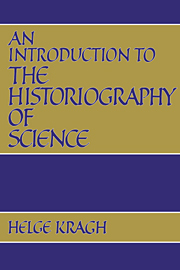Book contents
- Frontmatter
- Contents
- Preface
- 1 Aspects of the development of the history of science
- 2 History of science
- 3 Objectives and justification
- 4 Elements of theory of history
- 5 Objectivity in history
- 6 Explanations
- 7 Hypothetical history
- 8 Structure and organization
- 9 Anachronical and diachronical history of science
- 10 Ideology and myths in the history of science
- 11 Sources
- 12 Evaluation of source materials
- 13 Scientists' histories
- 14 Experimental history of science
- 15 The biographical approach
- 16 Prosopography
- 17 Scientometric historiography
- Notes
- Bibliography
- Index
14 - Experimental history of science
Published online by Cambridge University Press: 30 November 2009
- Frontmatter
- Contents
- Preface
- 1 Aspects of the development of the history of science
- 2 History of science
- 3 Objectives and justification
- 4 Elements of theory of history
- 5 Objectivity in history
- 6 Explanations
- 7 Hypothetical history
- 8 Structure and organization
- 9 Anachronical and diachronical history of science
- 10 Ideology and myths in the history of science
- 11 Sources
- 12 Evaluation of source materials
- 13 Scientists' histories
- 14 Experimental history of science
- 15 The biographical approach
- 16 Prosopography
- 17 Scientometric historiography
- Notes
- Bibliography
- Index
Summary
In spite of the fact that the past cannot be revoked, in one sense at least it can be investigated by experimental methods. Experimental history of science has not been used extensively or systematically and there are divided opinions about it. On the one hand, one might mention the Italian historian L.Belloni who has developed the experimental method in the history of medicine and biology in particular. According to Belloni, the reconstruction of historical experiments is of special value as a supplementary method for the interpretation of texts:
When we set to work on the study and reconstruction of the thought of an author, the analysis of his writings obviously cannot be undertaken apart from the general framework of the culture of his time. If then observations and experiments are described which in arrangement and technique are as distant from our habits and mentality as the cultural climate in which the author lived, the best and sometimes the only way of arriving at an exact interpretation of the text being considered lies in repeating the experiments under the same conditions under which they were originally performed.
On the other hand, there are historians who reject the experimental method on principle:
If we were to discover Dalton's thought, we could, it may be supposed, help ourselves by performing once again Dalton's experiments, which would put us in the situation in which he found himself thinking. We have only to assert this about Dalton to realise how unsound it is, … The activity of John Dalton shows us quite clearly the uniqueness of scientific acts of thought. […]
- Type
- Chapter
- Information
- An Introduction to the Historiography of Science , pp. 159 - 167Publisher: Cambridge University PressPrint publication year: 1987



